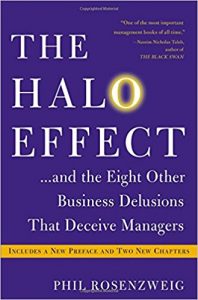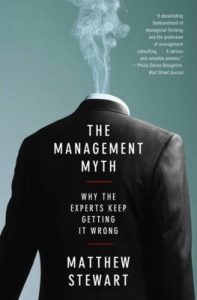Management Gobbledygook and Consulting Magic
 One of the best books I read in 2017 was The Halo Effect by Phil Rosenzweig.
One of the best books I read in 2017 was The Halo Effect by Phil Rosenzweig.
Phil Rosenzweig delivers a devastating attack on all self-help books and management gurus, who claim that their extensive research has proven that by doing what successful people or businesses do, you can also become successful.
Not just in a confined project?
No, in general – and over and over again!
However, it is not true. It is scientifically incorrect. Their conclusions are not valid.
There is not even a tiny probability that you will get the same results. You may be inspired, and that’s all. It’s good to be inspired, but the books promise miracle cures, and they can not deliver.
The Replication Crisis

Tomasz Tunguz, a venture capitalist at Redpoint
I subscribe to a great newsletter from Tomasz Tunguz (partner in Redpoint Ventures) and in his New Year’s email on January 1st, titled “Jettisoning The Assumptions Of Last Year“, he describes a crisis in academic circles entitled “The Replication Crisis”.
In short, the crisis is based on the fact that others cannot validate the results of most scientific trials. It’s a disaster. It means that the conclusions and recommendations that the research produce may be, and most likely is, incorrect. When management books are based on successful people and businesses, the germ of false findings has already been laid.
Since “In Search of Excellence” was released, a real avalanche of management books has emerged, all of which start by analysing successful people and companies, finding the common traits and turning them into generic guidelines. And all of them make the same fundamental mistake: They skip the control group. If you or anybody can find people and companies that actually follow the guidelines without achieving success, then what? You must prove that people and companies, that are unsuccessful, are doing very different things than the successful people and companies, otherwise, you have not proven anything.
Later in the newsletter, Tomasz explains that using the same methods in Machine Learning (Artificial Intelligence), as used in the management books, will systematically lead to wrong results (so, of course, you do not do that).
Tomasz’ post tickled my curiosity, and when at the same time he mentioned that The Management Myth: Debunking Modern Business Philosophy by Matthew Stewart was one of the most exciting books he had read for the last 15 years, I was soon on Amazon to download it for my Kindle.
A new torpedo in the water
 Reading Matthew Stewart’s book delivered some delightful hours in the armchair. The book is very well-written, entertaining, exciting, fun, insightful, well-documented, instructive, surprising and convincing (so I’ve run out of superlatives). If you are reading management literature, you owe it to yourself to read the book (plus The Halo Effect). I am sure that you will be able to understand better why most management books that promise success do not produce victories for other than the authors. As a bonus, the author tells about his own time as a management consultant. It’s the story of how a group of the world’s most expensive consultants were unable to get their own business to work. It is a very funny, but also tragic, tale.
Reading Matthew Stewart’s book delivered some delightful hours in the armchair. The book is very well-written, entertaining, exciting, fun, insightful, well-documented, instructive, surprising and convincing (so I’ve run out of superlatives). If you are reading management literature, you owe it to yourself to read the book (plus The Halo Effect). I am sure that you will be able to understand better why most management books that promise success do not produce victories for other than the authors. As a bonus, the author tells about his own time as a management consultant. It’s the story of how a group of the world’s most expensive consultants were unable to get their own business to work. It is a very funny, but also tragic, tale.
If you want a taste of Stewart’s approach to management theories and the management consulting industry, read his article “The Management Myth“, where he writes:
As I ploughed through tomes on competitive strategy, business process re-engineering, and the like, not once did I catch myself thinking, Damn! If only I had known this sooner! Instead, I found myself thinking things I never thought I’d think, like, I’d rather be reading Heidegger! It was a disturbing experience. It thickened the mystery around the question that had nagged me from the start of my business career: Why does management education exist?
The Management Myth: Debunking Modern Business Philosophy
 Title: The Management Myth: Debunking Modern Business Philosophy
Title: The Management Myth: Debunking Modern Business Philosophy
Number of pages: 352
Author: Matthew Stewart
Publisher: W. W. Norton & Company
Date of publication: 16 August 2010
Price: $9.99 + VAT for the Kindle edition. Other editions are available on Amazon
Recommendation: Recommended for anyone interested in business development, management and leadership.
Reviews: You can find more than 60 reviews and summaries on Amazon.com.







